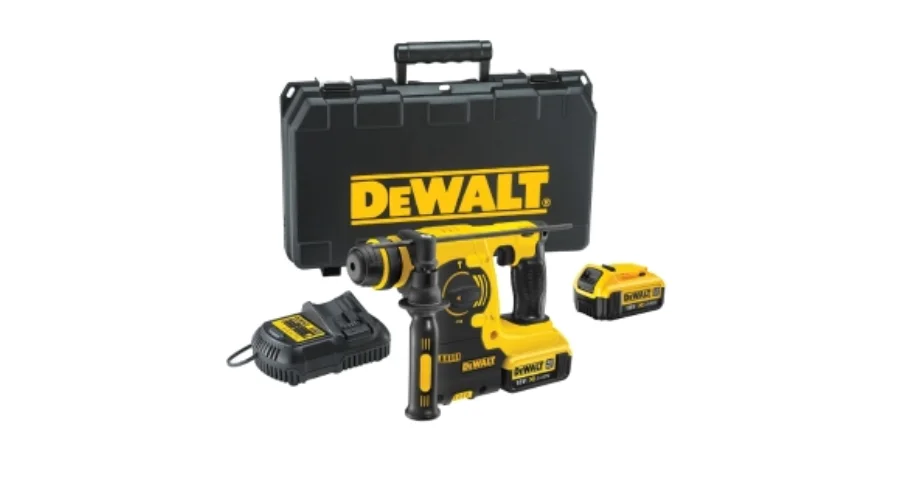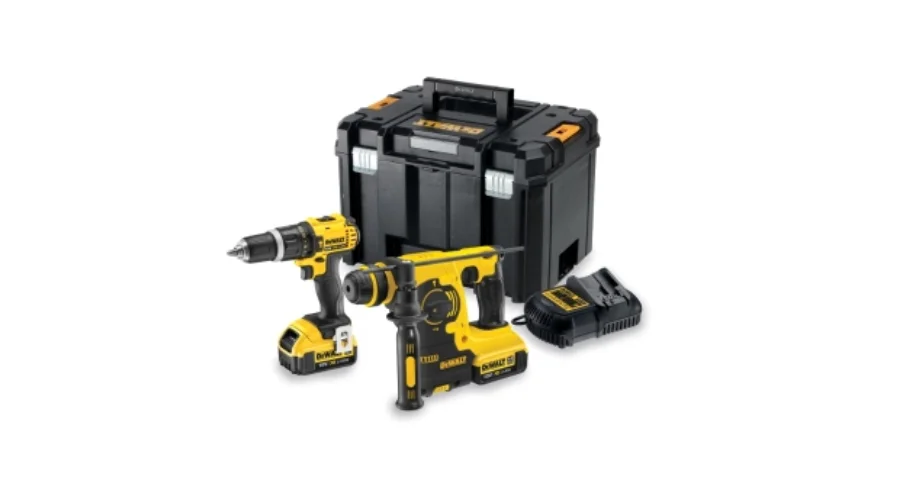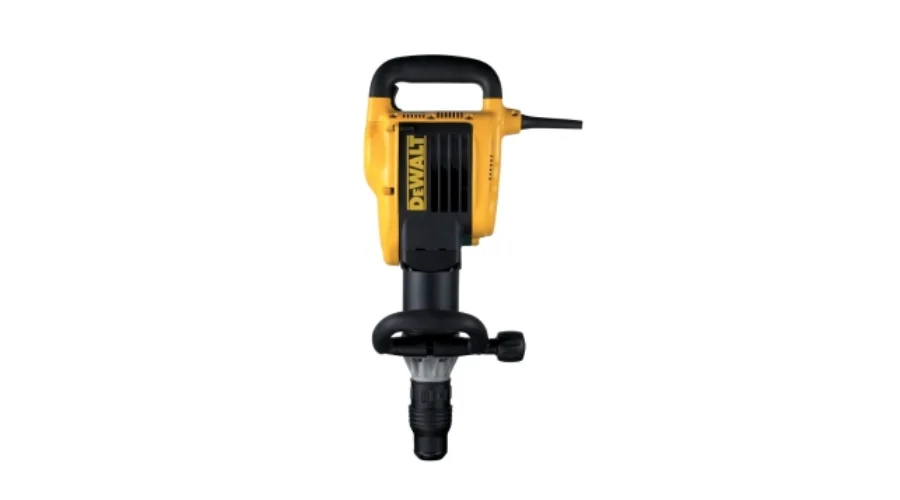Whether you’re a professional tradesperson or a DIY enthusiast, having a rotary hammer drill in your toolkit can significantly enhance your ability to tackle various projects efficiently and effectively. A rotary hammer drill, often referred to simply as a hammer drill, is a specialized power tool designed for drilling into tough materials such as concrete, masonry, and stone. Unlike conventional drills, which use a spinning motion to drive a hole into the material, rotary hammer drills employ a pulsating hammering action in addition to rotation. This dual-action mechanism makes them incredibly effective at penetrating hard surfaces.
How Does a Rotary Hammer Drill Work?
A rotary hammer drill operates by combining the rotational force of a standard drill with a rapid hammering motion. Here’s how it works:
- Rotation: Like a regular drill, a rotary hammer drill rotates the bit at high speed. This rotational motion helps maintain a straight and accurate hole.
- Hammering Action: Simultaneously, the drill also delivers rapid, short, and powerful hammer blows to the bit. These impacts break up the material, making it easier for the bit to advance.
- This combination of rotation and hammering creates a synergistic effect that allows the drill to bore through concrete and other hard surfaces with relative ease.
What Can You Use a Rotary Hammer Drill For?
The versatility of rotary hammer drills makes them invaluable for a wide range of applications. Here are some common uses for rotary drills:
1. Drilling into Concrete and Masonry
Rotary hammer drills are ideal for creating holes in concrete walls, floors, and foundations. This makes them essential for tasks such as installing anchors, fasteners, or electrical conduits in masonry.
2. Chiseling and Demolition
With the right attachment, rotary drills can be transformed into powerful chiseling tools. They can chip away old mortar, remove tiles, or even help with light demolition work.
3. Installing Pipes and Wiring
When you need to run plumbing or electrical lines through concrete or brick, a rotary hammer drill can quickly create precise holes without the need for excessive manual effort.
4. Home Renovations
For DIY home renovations or professional remodeling projects, rotary hammer drills come in handy for tasks like installing drywall anchors, drilling into tile, or adding wall-mounted fixtures.
5. Commercial Construction
In the construction industry, rotary hammer drills are indispensable for tasks such as concrete slab drilling, setting concrete screws, and preparing surfaces for rebar placement.
6. Outdoor Projects
Rotary hammer drills are not limited to indoor use. They can be valuable tools for outdoor projects, such as installing fence posts in concrete footings or creating holes for outdoor lighting fixtures.
Let’s look at some of the best hammer drills to buy from Travis Perkins:
1. DeWalt XR 18V cordless SDS plus 3-mode rotary hammer drill

Der DeWalt DCH253M2-GB rotary hammer drill boasts impressive technical specifications. It delivers up to 4500 blows per minute with a maximum drilling diameter of 24 mm in masonry, 26 mm in wood, and 13 mm in steel. This cordless drill operates at a no-load speed of 1200 rpm and weighs 3.10 kg. It features a Li-ion battery with a storage capacity of 4 Ah and comes with two batteries, a multi-voltage charger, and a kit box. With an 18 V voltage, a durable case, and a one-year guarantee, this DeWalt rotary hammer drill is a reliable choice for various drilling tasks.
2. DeWalt 54V Xr flex volt brushless SDS max hammer drill
The DeWalt DCH481X2-GB is a cordless hammer drill designed for high-performance masonry work. It operates at a maximum of 3150 blows per minute and has a maximum drilling diameter of 40 mm in masonry. This brushless drill offers a no-load speed range from 0 to 540 rpm and weighs 6.70 kg. It is powered by two 54V Li-Ion 9.0Ah XR FlexVolt battery packs with state-of-charge indicators, and it comes with a multi-voltage charger, multi-position side handle, and a durable TSTAK VI Kit Box for storage. This hammer drill is manufactured by DeWalt and has a one-year warranty; its model number is DCH481X2-GB.
3. DeWalt 18V 2 speed combi drill & SDS+ hammer drill

The DeWalt DCK206M2T-GB is a cordless power tool kit that includes a combi drill and an SDS+ hammer drill. It delivers a maximum torque of 60 Nm in hard materials and 23 Nm in soft materials, making it versatile for various tasks. It can drill up to 13 mm in masonry, 38 mm in wood, and 13 mm in steel. Powered by 18V Li-ion batteries with 5.0 Ah capacity, this kit comes with two batteries featuring state-of-charge indicators, a multi-voltage battery charger, a side handle, a depth stop for the DCH253, and a Tstak VI Kitbox for storage. DeWalt provides a 1-year guarantee for this power tool kit, and its model number is DCK206M2T-GB.
4. DeWalt 240V corded SDS-Plus 22mm 3 mode hammer drill
For high-performance drilling jobs, the DeWalt D25033K-GB corded rotary hammer drill is developed. It boasts a powerful 710W motor and delivers blows at a rate of 0 to 5680 bpm, making it suitable for various applications. This drill can handle a maximum diameter of 22 mm in masonry, 30 mm in wood, and 13 mm in steel. Weighing 2.50 kg, it offers a no-load speed of 1550 rpm and comes with a 4-meter-long cable for ample reach. The package includes the rotary hammer, a side handle for improved control, and a kit box for convenient storage. DeWalt offers a 1-year guarantee for this tool, and its model number is D25033K-GB.
5. DeWalt d25899K-GB 240V 10kg SDS max demolition hammer drill

The DeWalt D25899K-GB is a powerful electric tool with an impact energy of 17.9 J, designed for heavy-duty applications. It operates at a noise level of 100 dB(A) and weighs 9.90 kg, making it a robust and sturdy choice for various tasks. It operates at 240V and comes with a 1-year guarantee. The model number for this DeWalt tool is D25899K-GB.
Hammer Drill vs. Impact Drill: What’s the Difference?
While the terms “hammer drill” and “impact drill” are sometimes used interchangeably, they refer to distinct types of power tools with different functions. Understanding the differences between these tools is crucial for selecting the right one for your project:
Hammer Drill:
- A hammer drill is primarily designed for drilling into hard materials like concrete and masonry.
- It uses a hammering action in addition to rotation to create holes.
- drills are more robust and powerful than standard drills.
- They are suitable for heavy-duty drilling tasks that require penetrating hard surfaces.
Impact Drill:
- An impact drill, often known as an impact driver, is designed for driving screws and fasteners.
- It delivers high torque and concussive blows in a rotational motion.
- Impact drills are ideal for tasks like assembling furniture, driving screws into wood or metal, and working with stubborn or rusted fasteners.
- They are not designed for drilling into concrete or masonry.
In summary, while both drills and impact drills are valuable tools, their applications differ. A hammer drill is the go-to choice for drilling into tough materials, while an impact drill excels at fastening and driving tasks.
DeWalt vs. Makita Drill: Which One Should You Choose?
When it comes to reputable power tool brands, DeWalt and Makita are two names that consistently stand out. Both companies manufacture high-quality rotary drills, but there are some differences to consider when choosing between them:
DeWalt:
DeWalt rotary drills are known for their durability and ruggedness, making them suitable for heavy-duty use on construction sites.
- They often feature advanced technology, such as brushless motors and ergonomic designs.
- DeWalt drills are favored by professionals in the construction and remodeling industries.
- The brand offers a wide range of models to suit various budgets and project requirements.
Makita:
- Makita rotary hammer drills are praised for their performance and precision.
- They are renowned for their comfortable grip and reduced vibration, which enhances user comfort during extended use.
- Makita drills are popular among professionals and DIY enthusiasts alike.
- The brand offers a comprehensive lineup of rotary drills with various features and capabilities.
Ultimately, the choice between DeWalt and Makita will depend on your specific needs, preferences, and budget. Both brands are known for producing reliable and efficient rotary drills that can handle a variety of applications.
Is an Impact Driver the Same as a Hammer Drill?
While impact drivers and drills are both power tools used for drilling and fastening, they serve distinct purposes and operate differently:
Impact Driver:
- An impact driver is primarily designed for driving screws and fasteners.
- It delivers high torque in a rotational motion and uses concussive blows to break resistance, making it ideal for tasks like screwing in long or stubborn screws and bolts.
- Impact drivers are not suitable for drilling into concrete or masonry.
Hammer Drill:
- A hammer drill, as previously explained, is designed for drilling into hard materials like concrete and masonry.
- It combines rotation with a pulsating hammering action to create holes in tough surfaces.
- Hammer drills are used for tasks that require drilling into hard materials.
In summary, impact drivers and drills have distinct functions, and their capabilities should be considered when choosing the right tool for your project.
Abschluss
As a prominent supplier of construction and building materials, Travis Perkins offers a range of drills that cater to the needs of both professionals and DIY enthusiasts. These tools, designed for drilling into tough surfaces like concrete and masonry, are essential for various construction and renovation projects. Travis Perkins’ selection of hammer drills ensures customers have access to reliable and high-quality equipment, making their tasks more efficient and accurate. Whether you’re a tradesperson or a homeowner tackling home improvement projects, Travis Perkins’ drills are a valuable addition to your toolkit, helping you achieve precise and durable results. For more information on DIY tools, visit XprrtUpdates.
FAQs










